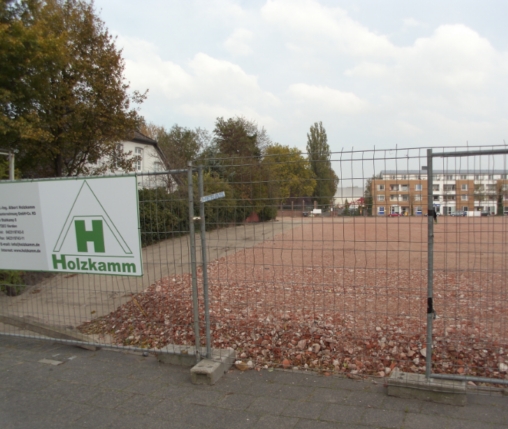Posts Tagged ‘Verden an der Aller’
My Anglo-Arabian Princess in the Muir
My wife, proud owner of a facebook profile, has told me that my recent topics aren’t nice. So now, for some nicer. It’s November, but surprisingly mild. Just the right weather for a classic-horsemanship training, late in the afternoon today.

Getting Started
Vaulted first…

some time later
… then on their own.
Unearthed and Buried again – the Remains of Verden’s Synagogue

Verden Synagogue site, Johanniswall, 2011
This used to be the site of Verden’s synagogue, from 1858 to 1938, before it was burnt down in the “Night of Broken Glass”. The place has been car dealer’s parking lot since early after the end of the war. In summer, the bulldozers were back. A shopping center will be built here, soon.
My guess about the future: one eighth of Verdeners may continue to add stolpersteine memorials to their city, and people will continue to traipse across them (literally, stolperstein means stumbling stone, but these won’t make you stumble), and try to put a Reichsbahn waggon next to the train station to remind people of the concentration camp transports, another quarter of Verdeners may continue to oppose Reichsbahn waggons, and all other Verdeners will be shopping on this site, and listen to the sermons in church on christmas eve.
A small town in Germany – or: how to avoid remembering a real bit of the past.
Oh, and the foundations and underground facilities (including the mikveh, I seem to understand) were unearthed in summer, and then returned to the underground.
The Kreiszeitung referred to the location as a “place of memory”. But that was long ago, in 2010.
Police Academy Professor: “Only Perceptions have Shifted”
In 1998, Rafael Behr worked as the head of a police task force or work group (Dienstgruppenleiter). After fifteen years of work as a policeman, he became a professor at Hamburg’s police academy (Hochschule der Polizei). This information, provided by Behr himself, in an article for Germany’s weekly DIE ZEIT, doesn’t give me an exact idea of how long ago he left the active police service.
“At the moment we begin to change ourselves, the world around us changes, too. Not just seemingly, but really“, his website at the academy (currently being relaunched) says. Behr’s field of work at the academy is sociology and coaching.
Things hadn’t become tougher for the police, Behr believes – or rather, “I can’t quite believe the complaints that things were getting worse” (Ich kann das Klagen der Polizei in Deutschland, dass alles schlimmer werde, nicht so recht glauben). “Police is neither defenceless, nor are things getting worse. But above all, there isn’t more violence aimed at the police. Only perceptions have shifted” (Polizisten sind weder wehrlos, noch wird alles immer schlimmer. Vor allem gibt es nicht mehr Gewalt gegen Beamte. Es hat sich lediglich die Wahrnehmung verschoben).
Expectations to the police had become more diverse, from a time somewhere in the late 1980s, Behr suggests. After all, police staff had to show empathy with victims, a sense of justice, communication skills, etc.. Violence, strangely, had been blinded out in that idealised new concept. When police staff happened on people with few or no prospects in life (resignierte und aussichtslose Lebensperspektiven), they were ill-prepared for such encounters. After all, resignation and exclusion [from society] were frequently combined with aggression, and police staff was usually recruited from the middle class, not from the class where aggression was a more frequent phenomenon.
Violence hadn’t increased, argues Behr, quoting the Criminological Research Institute of Lower Saxony. At times, violence was even decreasing. Rather than violence, it was insubordination which was on the rise, and where police staff wasn’t well-prepared. The use of the term “violence” had become inflationary.
It’s probably a matter of definition. According to German news magazine DER SPIEGEL (November 2010), the number of police seriously injured on duty rose by 60 per cent during the previous five years. (Seriously injured, of course, may be a matter of definition, too.) Closer to home, Verden’s nightlife has certainly changed, and the patrolman who was knived here in summer 2009 was a first-night in our small town.
I agree with his latter point – violence has been surrounded with taboos, to a silly degree. When even boxing becomes a “no” in “good society”, it’s no wonder that you can’t make violence a topic. Addressing it seems to be about as worldly innocent as asking Pope Benedict to discuss the benefits of buggery on television. And just as bad, addressing the former matter in an open-minded way may discredit you, just as addressing the latter one would discredit the Pope.
But that’s probably the only issue where I might agree with Behr. Let’s address a police person’s realities. One of these realities is that police staff bear guns. If someone approaches you as a police person, as happened on the Bremen Freimarkt last month, to adorn his or her face with lipstick colors (it seems to be a frequent practice), you better don’t carry a gun at all. To let unknown people come that close to you won’t be advisable otherwise. And frankly, just as these people wouldn’t paint the face of a carousel owner’s or a supermarket cashier’s face with lipstick, they shouldn’t be allowed to paint a police person’s face.
Behr replaces much of what is conveniently termed “violence” with “insubordination”. But that term, too, lacks definition. It seems to suggest that it is basically about some happy, occasional anarchism light. But that’s not the case, certainly not in Germany, which is still ticking like the corporate state it used to be. People who spit to the feet of police people (let alone into their faces) are angry, because a police person epitomises state power. The problem is that just as violence, power, too, is surrounded by taboos. German civil society, to quite a degree, and not only below the middle class, is unable to handle authority. Pastor Dietrich Bonhoeffer ´described stupidity this way, in 1943:
The fact that a stupid person is often stubborn should not deceive anyone into thinking he is independent. In conversation with him it is felt that you are not dealing with the person himself, but with cliches, slogans, etc. that have gained dominance over him. (Daß der Dumme oft bockig ist, darf nicht darüber hinwegtäuschen, daß er nicht selbständig ist. Man spürt es geradezu im Gespräch mit ihm, daß man es gar nicht mit ihm selbst, mit ihm persönlich, sondern mit über ihn mächtig gewordenen Schlagworten, Parolen etc. zu tun hat.)
I’m not trying to judge if the classical American cop approach – common wisdom suggests that it includes no fun factor – can be attributed to an innate American feeling that you are free anyway, and that (as a member of the middle class, anywaqy) you practically cooperate with, rather than cowardly submit to a cop. In Germany, a citizen’s feelings are much more likely to be dominated by concepts of authority and powerlessness than elsewhere. And when a cop in Germany comes across as weak, the mice will play. It’s hardly a coincidence that many Germans find the idea of Per Steinbrück for chancellor (that’s Germany’s political top job) not only tolerable, but even desirable. It’s hardly a coincidence that Helmut Schmidt, German chancellor from 1974 to 1982, and Wehrmacht lieutenant in the 1940s, endorsed Steinbrück last week, even before Steinbrück actually decided to apply for the job.
The times when a cop’s word “counted for something” are over, writes Behr. Those times wouldn’t come back, and a different society wasn’t in sight. “It is imperative to think police anew.”
Maybe. But before doing that, we must understand what our society – not just the “new underclass” – is actually like.
____________
Related
We, the Anti-Democrats, December 5, 2010
____________
Verden’s Commemoration Efforts: those Unhappy Memories
It has been said before that the way Germans remember their former fellow citizens – citizens murdered and expelled in the 1930s and 1940s, and many of them Jewish – may matter more to the German citizens of today, than to the actual victims, their surviving relatives and the following generations (many of whom live abroad).
This thought could make commemoration easier. It wouldn’t need to include the horrors, which can’t be adequately described anyway. People who once lived and worked here, and who worshipped their God in our town, would be remembered for the respect we owe them. People who, if this had always been a normal and decent country, could have stayed among us, rather than getting killed, or having to flee what had been their city and country, too.

Excavations on the old synagogue site, Verden, July 18, 2011
Verden’s synagogue was inaugurated in 1858, and burnt down during the “Night of Broken Glass” (Reichskristallnacht or Reichsprogromnacht) in November, 1938. Until recently a car dealership’s location, the old site is now to become a shopping center. Excavations have begun last week.
Some eight years ago, a Verden Society for Regional History (Verein für Regionalgeschichte Verden e. V.) planned to place a Reichsbahn railway waggon at Verden Railway Station, as a site to remember the haulage of forced labourers and other nazi victims to the concentration camps. The railway waggon was arsoned on January 2007.
For the arson attack alone, the waggon had served a function after all – the attack was a clear indication that commemoration of nazi crimes was deemed undesirable by certain quarters (something that many opponents would have liked to deny). But many Verdeners – correctly – pointed out that deportations by rail had taken place from Bremen, rather than from Verden, and that for historical reasons alone, Verden’s railway station was hardly the right place for the waggon.
In April 2010, Eilert Obernolte, teacher at Verden’s Domgymnasium (one of the city’s secondary schools) and two students, picked up a suggestion by city council member Jürgen Weidemann (FDP, liberal democrats) to find a way to commemorate the synagoge, within the shopping center concept.
While the railway waggon approach was questionable from a historian’s perspecitve, the synagogue is definitely part of Verden’s past. Now that the shopping center’s construction has begun, one wonders if and how the synagogue and Verden’s former Jewish congregation will be remembered.
Stay tuned.
